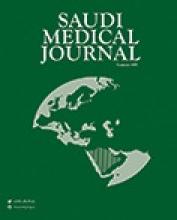Abstract
OBJECTIVE: To test the efficacy and toxicity of mefloquine therapy both on expectant mothers and the outcome of their pregnancies.
METHODS: We performed a prospective non-comparative clinical trial in New Halfa Teaching Hospital, Eastern Sudan, during the period October 1998 to June 2001. Pregnant Sudanese women were given mefloquine 25 mg/kg for treatment of falciparum malaria following chloroquine failure. The women were followed every 2 weeks in the antenatal clinic until delivery. The babies were followed until the age of one year.
RESULTS: Forty pregnant women were enrolled in the second and third trimesters. Itching which occurred in 17.5% and nausea which occurred in 35% were the cardinal side effects of the patients. Recrudescence or re-infection occurred on day 14 in one patient (2.5%). One patient that received mefloquine at 34 weeks gestational age delivered low birth weight (2.1 kg) at 39 weeks gestational age. One child died at the age of 7 months due to unexplained febrile illness. There was no abortion, no stillbirth and no congenital abnormality in the newborn children and no maternal death.
CONCLUSION: Forty pregnant women were enrolled in the second and third trimesters. Itching which occurred in 17.5% and nausea which occurred in 35% were the cardinal side effects of the patients. Recrudescence or re-infection occurred on day 14 in one patient (2.5%). One patient that received mefloquine at 34 weeks gestational age delivered low birth weight (2.1 kg) at 39 weeks gestational age. One child died at the age of 7 months due to unexplained febrile illness. There was no abortion, no stillbirth and no congenital abnormality in the newborn children and no maternal death.
- Copyright: © Saudi Medical Journal
This is an open-access article distributed under the terms of the Creative Commons Attribution-Noncommercial-Share Alike 3.0 Unported, which permits unrestricted use, distribution, and reproduction in any medium, provided the original work is properly cited.






